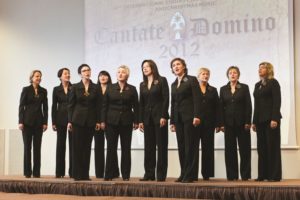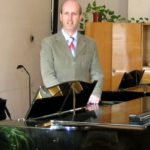Cantate Domino, Kaunas, 13-16 Décembre 2012
Un Festival Choral dans l’Atmosphère Magique de la Lituanie
Par Andrea Angelini, Rédacteur en chef de l’ICB, chef de chœur et professeur
Il y a plus de 200 ans, le 23 juin 1812 Napoléon Bonaparte et sa Grande Armée de 690.000 hommes traversèrent le Niémen aux abords de Kaunas, entrant ainsi en Russie et entamant leur marche malheureuse sur Moscou. Kaunas, connue alors sous le nom de Kovno, était un avant-poste animé de la frontière de L’Empire Russe et de l’éphémère Duché de Varsovie, comptant une abondante population russe, polonaise et juive et seulement une poignée d’habitants de l’ethnie lituanienne. Deux siècles et plusieurs guerres dévastatrices plus tard, Kaunas est aujourd’hui renommée localement comme étant la plus lituanienne des grandes villes de Lituanie. Comme les temps ont changé!
Kaunas s’enorgueillit de sa Vielle Ville, compacte et bien préservée, avec ses grandes artères sans embouteillages. De beaux bâtiments du XVIème siècle décorent la rue de Vilnius, et plusieurs endroits de la Place de la Mairie. Vous êtes presque certains de tomber sur plusieurs galeries d’art moderne logées dans ces édifices historiques. La ville est érigée au confluent des fleuves Niémen et Neris, et vous pouvez facilement vous perdre dans le décompte des parcs verdoyants qui existent dans son centre; le Parc Santaka, est l’un d’eux, un endroit magnifique pour se promener parmi les bouleaux, les chênes et les érables. C’est dur de croire que vous êtes toujours au cœur d’une ville si dynamique.
Arriver à Vilnius par l’aéroport, a priori c’est l’idéal. Mais espérer trouver le printemps, en décembre sous ces latitudes, c’est de la folie pure. Passant à travers une violente tempête de neige, les roues de l’avion touchèrent enfin la piste de façon brutale, assez pour que plusieurs passagers se mettent à crier. Ronaldas (Daugėla) et Silvija (Pročkytė), respectivement directeur artistique et assistant au festival, m’attendaient à la porte de sortie. Un périple de deux heures me conduisit jusqu’à l’hôtel à Kaunas.

Le jour suivant était consacré à la visite de la ville (Il y a plusieurs endroits intéressants au centre historique, et plusieurs pubs chaleureux) même si la température extérieure (quelque part entre -12° et -21°), suggérait que je reste à l’hôtel. Je ne sais pas ce qui était plus drôle entre voir Ronaldas marcher dans la neige avec seulement une veste (ni chapeau, ni écharpe) et moi, couverte de vêtements et paraissant être prête pour une expédition polaire! A propos j’ai eu un moment agréable en me déplaçant entre un grog et un café chaud : un charmant concert de soirée donné par certains membres du chœur et suivi par l‘Oratorio de Noël de Bach présenté par le chœur lituanien d’enfants Varélis qui clôtura le premier jour du festival.

Le concours (catégorie sans programme obligatoire) démarra le matin du 14 décembre dans la salle de conférences de l’Hôtel Park-Radisson, un grand espace avec quelques centaines de sièges pour l’auditoire. Le niveau des chorales participantes dans ce classement n’était pas très bon, même si un chœur m’impressionna plus que les autres. En fait, le seul groupe admis au ‘Grand Prix’ fut le Tartu Youth Choir dirigé par Riho Leppoja et Kadri Leppoja. Le score final de ce chœur était 91,2/100. Les chœurs participant à la catégorie obligatoire du programme avaient un bien meilleur niveau de qualité. Ici, au moins, trois groupes se démarquaient nettement des autres. Il y avait les Raffles Voices (Singapour) dirigées par Toh Ban Sheng, l’Ivanovo Chamber Choir (Russie) dirigé par Evgeny Bobrov, l’Ensemble A Cappella vocal mixte (Lituanie) conduit par Violeta Zutkuvienė et, encore une fois, le Tartu Youth Choir. Ainsi, quatre chœurs jouèrent leurs dernières cartes pendant le dernier jour du match final dans l’Auditorium du Séminaire. Les Raffles Voices remportèrent le Grand Prix haut la main avec une note de 97,5/100 points!

J’ai rencontré plusieurs fois cette chorale à travers le monde et je suis toujours impressionnée par son rythme, les qualités expressives et le son. Des garçons absolument concentrés et sérieux! Puis-je suggérer une chose, M. Sheng? J’aimerais voir plus de morceaux dans votre répertoire, surtout au cours de la saison de Noël.

Cantate Domino canticum novum… (Chantez au Seigneur un chant nouveau…), ceci est le thème du Festival. Je suis sûre que Dieu était content d’avoir entendu de si riches et agréables musiques pendant ces trois jours!
 Andrea Angelini est diplômé en piano et direction de chœur. Il mène une vie artistique et professionnelle intense à la tête de plusieurs chœurs et ensembles de musique de chambre. Il a employé son expertise particulière dans le domaine de la musique Renaissance pour offrir des stages et des conférences dans le monde entier. Il est fréquemment invité en tant que juré dans les concours choraux les plus importants. Aux côtés Peter Phillips il a enseigné pendant des années aux Cours Internationaux pour Choristes et Chefs de Chœurs de Rimini. Il est le directeur artistique du festival choral Voce Nei Chiostri et du Concours International Choral de Rimini. Depuis 2009, il intervient également en tant que rédacteur en chef de l’ICB. En tant que compositeur, certaines de ses œuvres ont été publiées chez Gelber-Hund, Eurarte, Canticanova et Ferrimontana. Courriel : aangelini@ifcm.net
Andrea Angelini est diplômé en piano et direction de chœur. Il mène une vie artistique et professionnelle intense à la tête de plusieurs chœurs et ensembles de musique de chambre. Il a employé son expertise particulière dans le domaine de la musique Renaissance pour offrir des stages et des conférences dans le monde entier. Il est fréquemment invité en tant que juré dans les concours choraux les plus importants. Aux côtés Peter Phillips il a enseigné pendant des années aux Cours Internationaux pour Choristes et Chefs de Chœurs de Rimini. Il est le directeur artistique du festival choral Voce Nei Chiostri et du Concours International Choral de Rimini. Depuis 2009, il intervient également en tant que rédacteur en chef de l’ICB. En tant que compositeur, certaines de ses œuvres ont été publiées chez Gelber-Hund, Eurarte, Canticanova et Ferrimontana. Courriel : aangelini@ifcm.net
Traduit de l’anglais par Pierre Peterson (Haiti)
Edited by Gillian Forlivesi Heywood, Italy